Wes Anderson Ranked
You won't find any style vs. substance arguments here. I love his films......mostly.
Greetings and salutations! I feel like it’s fitting to use to talk about this guy.
I know this is coming a little later in the day than usual. But with the wider release of Asteroid City, I feel like it’s only fitting to have a post dedicated to Wes Anderson. He has been written about over and over. Sometimes as one of the leading auteurs of Generation X, among the likes of Quentin Tarantino, Paul Thomas Anderson and David Fincher. Other times as a hacky stylist that has very little substance in his films.
The latest examination of his work ahead of Asteroid City’s release was these trailers that were made by artificial intelligence that essentially mocked the director’s style. His style has been examined before by the likes of Saturday Night Live and cinephiles a like. To try and describe his visual style in one paragraph would be doing a disservice to Anderson, so here’s a video you can watch if you are interested. But Anderson is also known for unique stories that feature black comedy, drama, grief and social isolation. Of course, the director also gets to benefit from the ensemble casts where many great actors like to work for him over and over again.
I’m not including Asteroid City, which I saw last night, on this post and will save it for next week. Let’s just say I enjoyed it a lot. Anyway, this post is already so unbelievably long (apologies to all the people who read this in the email), let’s get to it:
#10 The Life Aquatic with Steve Zissou (2004)
C+
I don’t know why I was underwhelmed with this film. Maybe I need to rewatch it. Nonetheless, The Life Aquatic with Steve Zissou lands at the bottom of the list because I frankly wasn’t as interested and never felt connected to the characters in this story.
Bill Murray, who stars as the titular oceanographer, has been one of Anderson’s most frequent collaborators. His presence has always been in a supporting role aside from The Life Aquatic. It’s where Murray has thrived. But this film gave him quite frankly too much screen time and the mopey protagonist eventually reaches the point of diminishing returns for me.
The Life Aquatic, which serves as Anderson’s last time working with Buena Vista Pictures, feels like the director’s most mean spirited film. As Steve Zissou looks for the “jaguar shark” that killed his partner, he encounters Ted Pimpton (Owen Wilson), a massive fan of the oceanographer who claims to be his son. I was never convinced by their connection at all. Sure, anyone could say that about any of Anderson’s films. But not for one moment was I rooting for Zissou.
Of course, the C+ grade indicates that I did enjoy this film. Anderson’s style and humor still remain solid throughout this picture. I particularly liked Willem Dafoe’s performance as Klaus, the assistant of Zissou. Plus the reveal of the jaguar shark at the end of the film remains memorable and charming for me.
If I am being honest, I’ll probably rewatch this soon and enjoy it. But for the first time watching it, I couldn’t say I was a massive fan.
#9 The Darjeeling Limited (2007)
B-
The follow up to The Life Aquatic is certainly an improvement for Anderson, but I still wasn’t all that impressed. To me, the thing that holds me back from fully liking The Darjeeling Limited was chemistry. I just didn’t feel a connection between the three brothers: Francis (Owen Wilson), Peter (Adrien Brody) and Jack (Jason Schwartzman).
The trio travels to India a year after the death of their father. Francis, the controlling older brother who suffered a motorcycle accident, gets Peter and Jack to travel with him across the subcontinent to visit their estranged mother (Anjelica Huston). Along the way, mostly taking place on the titular train, the brothers encounter romantic interests and villagers in danger.
Anderson, along with fellow screenwriters Schwartzman and Roman Coppola, crafts some of his trademark clever and funny dialogue. But chemistry again remains an issue for me as Wilson, Brody and Schwartzman, all terrific actors in my book, don’t really establish a connection.
Maybe my issue with it is the character construction itself. I personally wasn’t a fan of Francis. His overcontrolling nature never sat well with me and his reveal of insecurity by the end of the movie felt kind of forced. Once the boys reconcile after meeting with their mother, it felt very unnatural. I feel like critics of Wes Anderson could easily point to this and The Life Aquatic as what’s wrong with the director and his style. Although, I could rewatch this again and be pleasantly surprised.
#8 Bottle Rocket (1996)
B+
An underrated work of 90s independent cinema, this movie put Anderson on the map. I’m not just saying that because it was his first feature film. The director started getting major attention from legendary filmmaking figures like Martin Scorsese, who named Bottle Rocket to his top 10 films of the 1990s list. It’s not hard to see why.
Rookie criminals Dignan (Owen Wilson) and Anthony (Luke Wilson) are trying to pull off numerous heists. But they eventually realize that they stink at robberies. After recruiting their neighbor (Robert Musgrave), the group of me search for Dignan's previous boss, Mr. Henry (James Caan). On this road trip, Anthony falls for motel maid Inez (Lumi Cavazos). Anderson perfectly shows how stupid these characters are, a type of comedy that he does and paradoxically doesn’t at the same time.
You can really see that this film is the work of a man that was still trying to find himself as a filmmaker. The style that I have and will mention time and time again is not present anywhere in this movie. There are various angled shots that are nothing like the symmetry that Anderson now uses as his trademark.
Even if fans of the director may be thrown off by the fact that they’re watching a Wes Anderson movie that doesn’t feature the qualities that make him great and distinct, that doesn’t stop the movie from being enjoyable. It’s a great independent work by a man just dipping his feet into the film industry, and I would say Anderson was quite successful on that front.
#7 Isle of Dogs (2018)
B+
Isle of Dogs is certainly out there, even for Anderson. Not just because it’s another animated film, but because the director decides to portray Japan and Japanese culture. Critics have argued that there was racial stereotyping and depictions of the white savior narrative. And I can’t say I disagree with them. It makes me hesitant to become attached to this movie, but it’s hard to tell how Anderson toes the line between cultural appreciation and insensitivity.
The dogs in the film, who are exiled to an island full of trash due to an influenza pandemic, are super adorable. The group we follow — Chief (Bryan Cranston), Rex (Edward Norton), Boss (Bill Murray), King (Bob Balaban) and Duke (Jeff Goldblum) — create comedy throughout the film, particularly in one scene where the five dogs fight another pack of dogs for trash. The group then encounters 12-year-old orphan Atari Kobayashi (Koyu Rankin) who is looking on the island for his dog Spots (Liev Schreiber). Chief and Atari eventually get separated from the group and form a delightful bond throughout the rest of the movie as they try to fight an authoritarian mayor (Kunichi Nomura) who banished the dogs to begin with.
But the human characters in Isle of Dogs are where I start to lose interest. American exchange student Tracy (Greta Gerwig) has been cited as an example of a white savior since she fights to get the dogs back to Megasaki. It also doesn’t help matters that many of the Japanese characters are kind of stereotyped with very short and choppy dialogue. While the Japanese language is rarely translated for the viewer, giving those characters a sense of autonomy in a way, the stereotyping does feel unavoidable, especially coming from a white filmmaker like Anderson.
Still, to say I wasn’t enthralled by the film would be a lie. I still enjoy Anderson’s aesthetic, which makes it a better movie than most. But I still have to hold back my praise by just a bit.
#6 The French Dispatch (2021)
B+
As a journalism kid, I have a soft spot for The French Dispatch. Anderson nails the little details of what goes into making a magazine and the film is structured like a magazine. You get one small article, three features and an obituary of the magazine’s editor (Bill Murray), setting up the anthology structure of the series.
We start with a reporter (Owen Wilson) delivering a cycling tour of the French town that is in focus in the magazine. Then, J.K.L. Berensen (Tilda Swinton) reports on the relationship between prisoner Moses Rosenthaler (Benicio del Toro), who makes beautiful art inside the prison walls, and Simone (Léa Seydoux), a prison guard that serves as Rosenthaler's muse. I found this to be the most fun and interesting story. Some of the supporting actors include Bob Balaban, Henry Winkler and Adrien Brody serving as the antagonist.
In the next story, lonely journalist Lucinda Krementz (Frances McDormand) covers a student revolution, led by Zeffirelli (Timothée Chalamet). While Krementz tries to maintain journalistic objectivity, she ends up becoming actively involved in the revolution. I would’ve liked this dynamic and examination of journalism more if Krementz and Zeffirelli didn’t get romantically involved. It throws me off and makes the ending of this second feature story feel a little bleh. I get trying to also examine the loneliness of a writer, but it didn’t work for me.
The final feature involves food journalist Roebuck Wright (Jeffrey Wright) recounts attending a dinner with a police commissioner (Mathieu Amalric), featuring a legendary police chef (Stephen Park) and a kidnapped son (Winston Ait Hellal). Anderson fully dives head first into his style, blending the black and white setting with an animated chase sequence. It feels like it’s Wes Anderson at his most.
But I could say that about the whole film. With each passing movie, Anderson leans into his style more and more. I really felt like this was Anderson at his most (at least until Asteroid City). Is it good? For the most part, yeah. But sometimes The French Dispatch feels a little hollow, and I can’t shake that feeling.
#5 Rushmore (1998)
A-
The first film where Anderson’s trademark style comes to fruition. The symmetrical shots, slow motion, great soundtrack, sharp dialogue, the incorporation of plays and flat camera movements all appear in Rushmore. Also, the director’s frequent collaborators like Jason Schwartzman and Bill Murray first worked with him on this movie.
The ambitious middle schooler Max Fischer (Schwartzman) takes part in a ton of extracurricular activities at the prestigious Rushmore Academy but doesn’t have many friends and fails most of his classes. But he eventually falls under the wing of depressed Rushmore parent Herman Blume (Murray) and falls in love with widowed elementary school teacher Rosemary (Olivia Williams). Besides the massive age gap between Max and Rosemary, a big issue is that Herman and Rosemary start falling in love. The humor that makes you sure of whether to laugh or cringe makes Rushmore Anderson’s first real great movie.
You can also feel how much of a personal story this is for Anderson (I hope the middle schooler liking a teacher wasn’t based on a real life experience, though). Rushmore really acts as a truly great coming of age story about a boy who feels out of place in high school. It taps into a hidden reason why Anderson’s films are so great. For all the style and the eccentric characters, his stories are about people struggling to fit in and find out who they are during their youth. Like Max, Anderson went down his own damn path and became the most singular auteur working today.
The film is such a rewarding and fulfilling experience. You can feel good, coming out of that movie as Max really ends his path of self-discovery. Most movies will give you a good ending even though the story never really earns it. With Rushmore, you are taken on a journey of the three act structure that feels great as it does uncomfortable.
#4 Fantastic Mr. Fox (2009)
A-
I remember this movie even though I was a 7 or 8-year old in 2009. For all the cartoons I consumed, Fantastic Mr. Fox felt different. Whether it be the color palette, the stop motion animation or the humor, I could tell that there was something distinct about Anderson’s first foray into animation.
And boy oh boy was this an achievement for Anderson. With hindsight, his transition into making animated films feels natural. The stop motion looks so finely tuned, and some of the distinct compositional elements that make up Anderson’s canvas lend themselves to beautiful animation.
Fantastic Mr. Fox also features probably the best leading duo in any of his films in terms of true star power. Mr. and Mrs. Fox are played by superstars George Clooney and Meryl Streep respectively. In his only appearance in an Anderson picture, Clooney is in my eyes the second best Anderson leading actor. He’s so fucking suave and charming as a robber and the patriarch of the Fox family. Meanwhile, Streep carries the film through many parts of the second and third acts. The chemistry between the two performers is quite impressive and makes for an all more enjoyable experience.
The Fox couple starts the film as a Bonnie and Clyde duo, stealing food from British farmers until Mrs. Fox reveals she’s pregnant. But after 12 fox years (two human years) later, Mr. Fox gets called back to the life of stealing from the devilish three farmers Boggis, Bunce and Bean. Meanwhile, Fox’s son Ash (Jason Schwartzman) tries to impress his father while his cousin Kristofferson (Eric Chase Anderson) delights everyone at every turn. When the farmers force Mr. Fox, his family and his friends underground, he has to retaliate.
The script, written by Anderson and acclaimed writer director Noah Baumbach, offers a clever and fun story. The duo makes the film much more friendly for children, which usually goes against Anderson’s humor. I think the film made for children works for Anderson, who typically shines at visualizing childlike wonder. Therefore, Fantastic Mr. Fox deserves a place in the top five.
#3 The Royal Tenenbaums (2001)
A-
If Rushmore is the film where Anderson found his style, one could argue The Royal Tenenbaums is where he finely tuned it to perfection. By this point in 2001, Anderson now has the dynamite casts that feature big names like Gene Hackman, Alec Baldwin, Ben Stiller and Gwyneth Paltrow. But he and cinematographer Robert Yoeman (I should’ve mentioned him so much earlier) perfectly nail the camerawork that makes the home of the Tenebaum family look like a magnificent high rise dollhouse.
The family in question features emotionally distant parents Royal (Gene Hackman) and Etheline Tenenbaum (Anjelica Huston) and the three children Richie (Jason Schwartzman), Chas (Stiller) and Margot (Gwyneth Paltrow). The kids have remarkable success in their youth but start to become depressed failures in their adult years. It’s an interesitng dynamic that Anderson has played with numerous occasions where the children always act like the adults and the adults always act like children. We can especially see this through Hackman’s character. Even though Hackman didn’t enjoy his time with Anderson, he brings in one of his finest performances of his storied career. As the patriarch of the Tenenbaum’s, Hackman acts like a man child for most of the movie and does it in a way that makes you love him and get sick of him at the same time. At least that’s how I felt about his performance.
As Royal tries to reconcile with his family before the supposed terminal illness kills him, we get some borderline insane stories with the children. Richie and Margot, brother and sister mind you, eventually develop a romantic affair and we have Eli Cash (Owen Wilson), a childhood freind of the Tenenbaum kids, crash a car. Anderson’s blend of dark humor and relatable characters make us unsure of whether or not we should be rooting for these people. But somehow we do.
Out of any of Anderson’s movies, The Royal Tenenbaums is by far the best at examining family dynamics and the profound effect parents can have on children. The film can be jarring at times but it has to be undoubtedly mentioned as of one of the director’s three finest movies.
#2 Moonrise Kingdom (2012)
A
Now we’re at the two movies that I feel are a cut above any of Anderson’s other films and would definitely land on a list of my 100 favorite films of all time. Let’s start with Moonrise Kingdom.
I’ve written before about how Anderson captures like childhood and childlike wonder better than anybody working in the industry today. This 2012 masterwork fully cements that status. Set on the New England island of New Penzance, an orphan boy scout Sam (Jared Gilman) runs away with 12-year old girl Suzy (Kara Hayward) to find an isolated beach. With none of the adults and fellow kids in their lives showing them any affection, they decide to go on a romantic escape. As this happens, Captain Sharp (Bruce Willis) tries to look for them while hiding his affair with Suzy’s mother (Frances McDormand).
Taking inspiration from French films like The 400 Blows, Anderson tries to give the children complete independence and how beautiful that can be. As a child who always valued his independence, Moonrise Kingdom really spoke to me in a way not many of Anderson’s films have. I felt so invested in Sam and Suzy’s story and the depiction of young love is heartwarming even though they are just 12 years old. Plus, there are some truly hilarious moments like when Scout Master Ward (Edward Norton) makes the fellow kids find Sam, the scouts become bounty hunters.
I must also note Willis’ performance. I always like the frequent Anderson collaborators but I’ve always been more attached to the actors who only come in for one of his movies and tries to work in that style. If you haven’t noticed, the top 4 movies all feature a great performance from an actor who only made an appearance in that Wes Anderson film (George Clooney in Fantastic Mr. Fox, Gene Hackman in The Royal Tenenbaums, and you’ll see who I’m talking about at No. 1 (Also of note is Tom Hanks in Asteroid City)). Willis, one of the greatest action stars ever, has a grand authority and vulnerability in his performance and eventually takes on a fatherly role for Sam. In most of Anderson’s films, we only get failed patriarchs. I really appreciate that he tries to show a sense of redemption for Willis’ character by becoming a father figure at the end.
I really could go on and on about my deep love for this film and how it taps into things about myself. But we still have one more film to go.
#1 The Grand Budapest Hotel (2014)
A
I kid you not, The Grand Budapest Hotel has a place on my top 10 list for best movies of the 2010s. Anderson really reaches his absolute peak with this film. He finds the perfect blend of his trademark style, humor and aesthetic to create a complex story that doesn’t betray his brand of storytelling.
But Anderson really taps into the talent of his incredible ensemble cast and he also receives one of the finest leading performances of the decade. The prestigious concierge of the titular hotel is Monsieur Gustave H, played magnificently by Ralph Fiennes. When I first watched Gustave H, I felt he was synonymous with elegance and grace, fit for the man who ran this incredibly distinguished hotel. But when I rewatched the film, I instead found a lonely man that was trying so desperately to live up to that aforementioned image. As Gustave H teaches his successor Zero (Tony Revolori), we see how alone this concierge is. For all of this charm and suave, he only has himself. Fiennes portrays one of Anderson’s most complex characters, wonderfully capturing all of the prestige and all of the comedy of manners Gustave H represents.
If you’re not hooked by Fiennes’ performance, there’s a great story to get attached to. The opening of the movie features a young woman visiting a shrine of a renowned writer (Jude Law/Tom Wilkinson), who wrote a book that shares the title of the film. The author recounts his 1968 vacation to the hotel, where he meets an elder Zero who tells his life story. In 1932, the younger Zero becomes a lobby boy at the Grand Budapest and falls under the wing of Gustave H. From there, Gustave finds himself the recipient of a priceless painting and the chief suspect in the murder of an elderly guest (Tilda Swinton), who also was a lover of the concierge. And on top of that, Zero falls in love with an apprentice baker named Agatha (Saoirse Ronan). If you couldn’t tell, this is distinct Wes Anderson.
But what makes the film unique is that Anderson grounds the story in reality by recognizing the passage of time. What I mean by this is that while Gustave H’s plot to save the priceless painting and clear his name is harrowing, it doesn’t matter in the end as Gustave, Agatha and even the author we meet at the beginning all die in the end. Even our first glance at the hotel is of it way past its heyday and it eventually gets torn down off-screen. While Anderson acknowledges that none of these stories matter since everyone in the story eventually passed away, the meaninglessness of the plot is OK and the viewer can appreciate the beauty and humor of the moment.
The director asks us to go along for the ride with him, all the aforementioned actors, cinematographer Robert Yeoman, actors Adrien Brody and Willem Dafoe (who both serve as antagonists) and many more.
It’s a shame I first watched this on an airplane. My one dream is to watch this film in theaters. The colors, cinematography, score, cast and atmosphere always make me smile and transport me into a whole new world where I laugh, feel uncomfortable and weirdly renewed. And that’s the world of Wes Anderson.




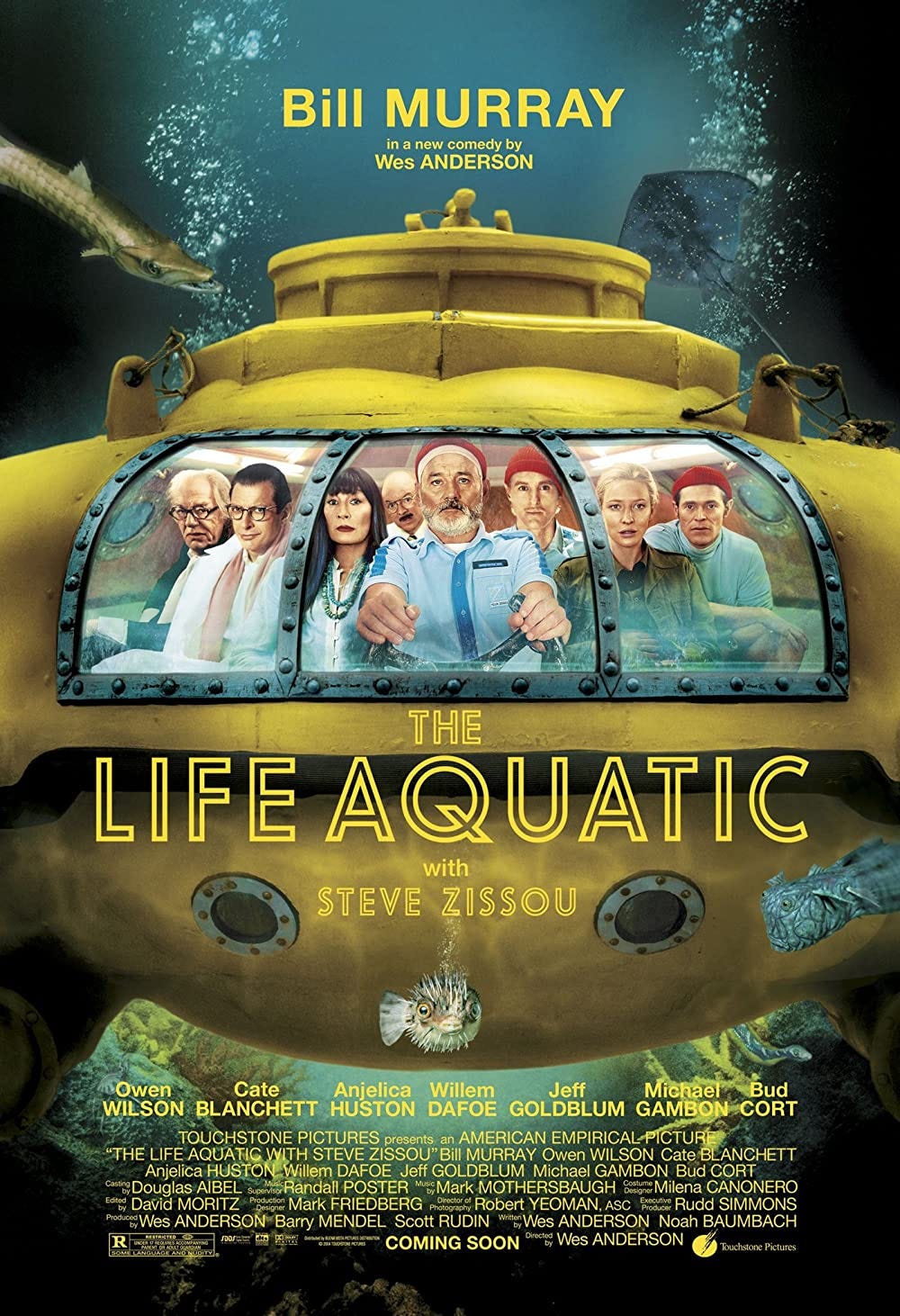


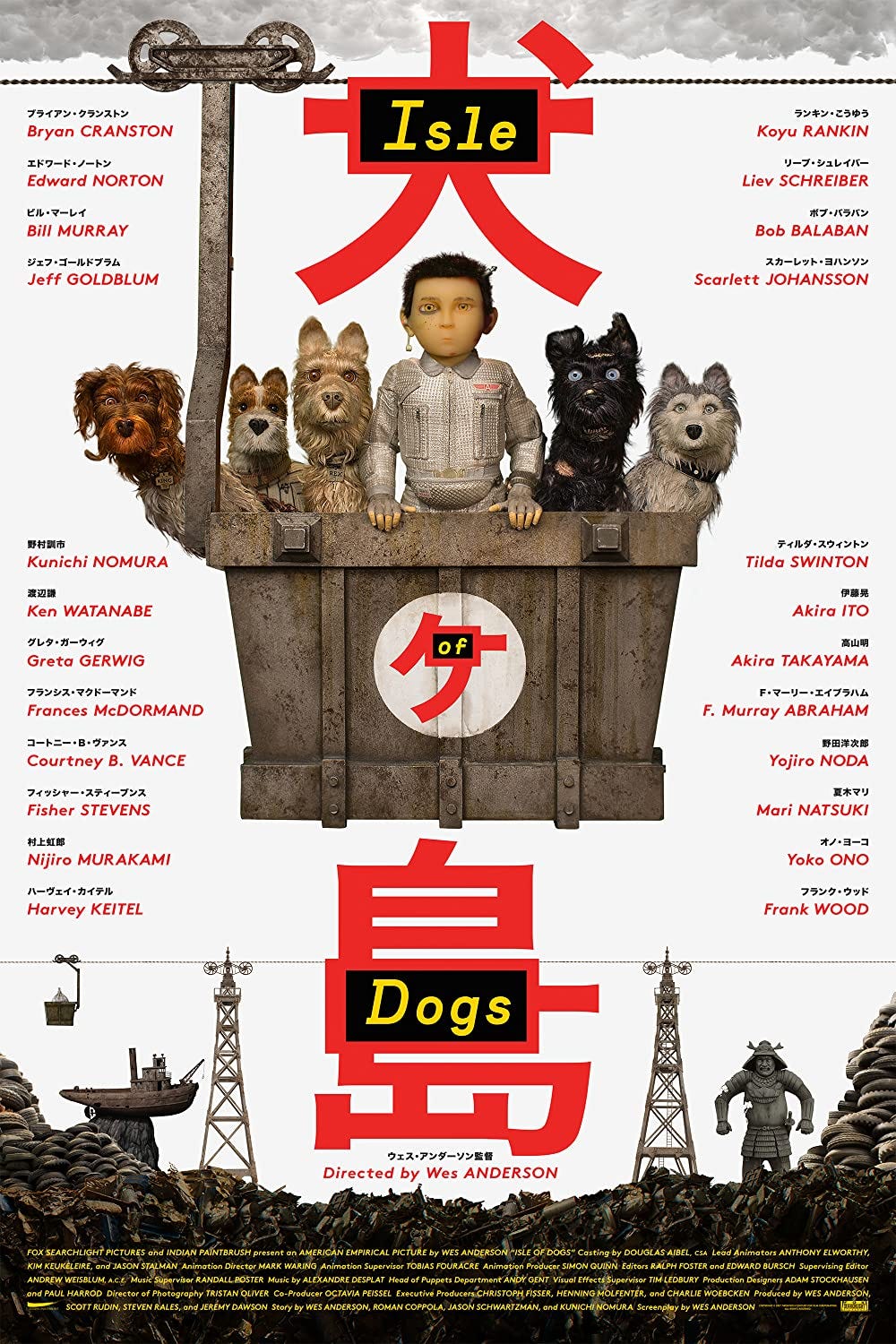

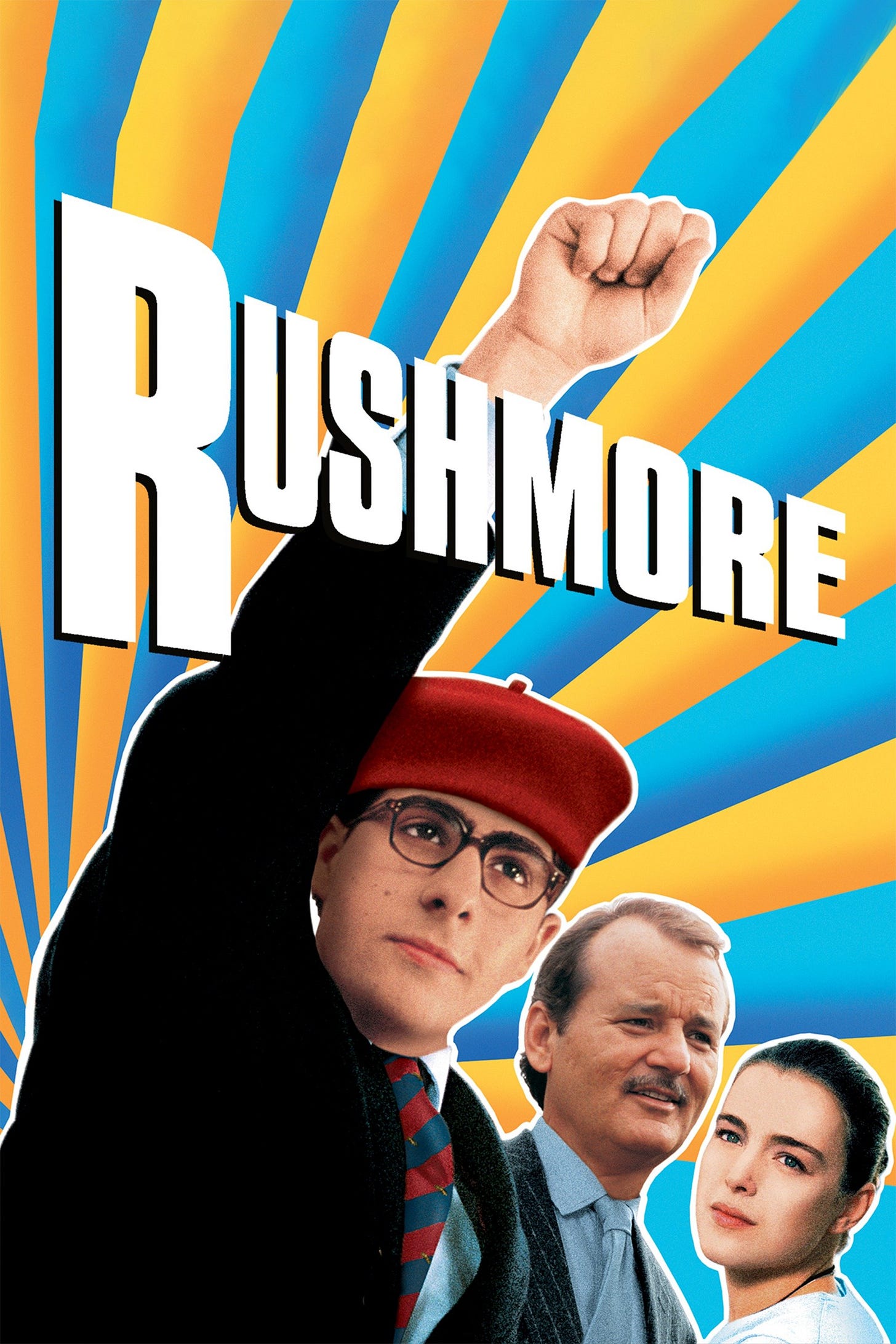
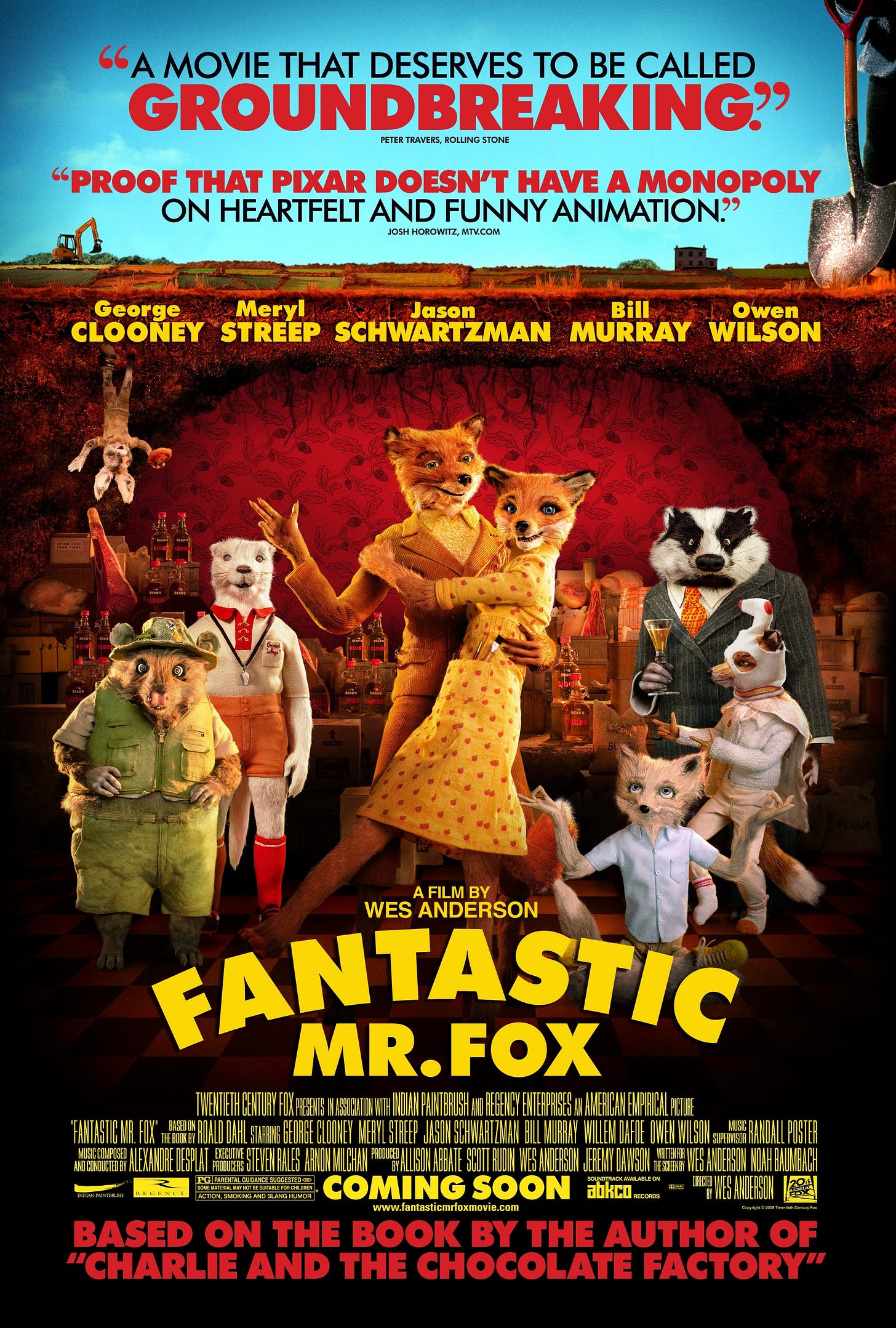
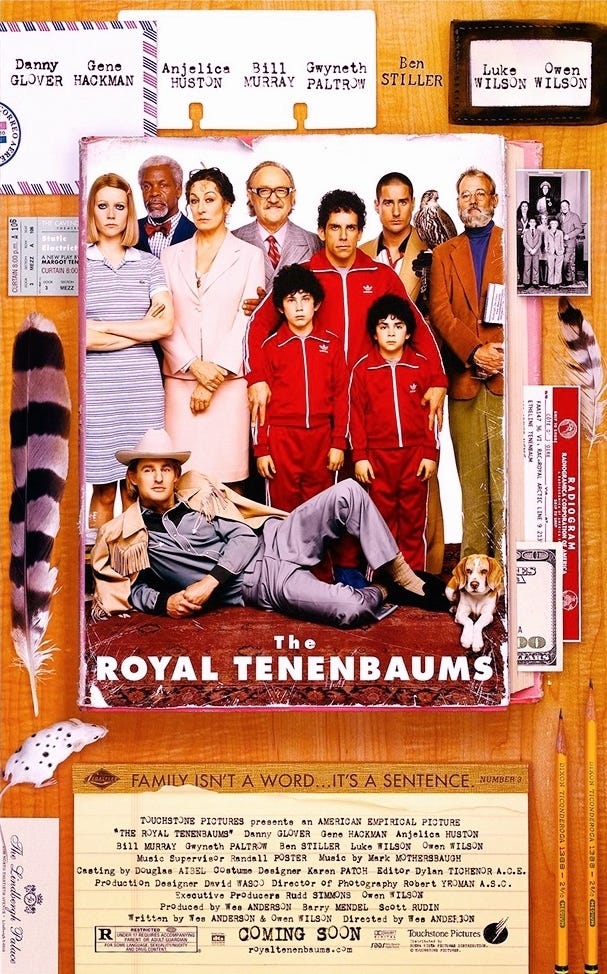

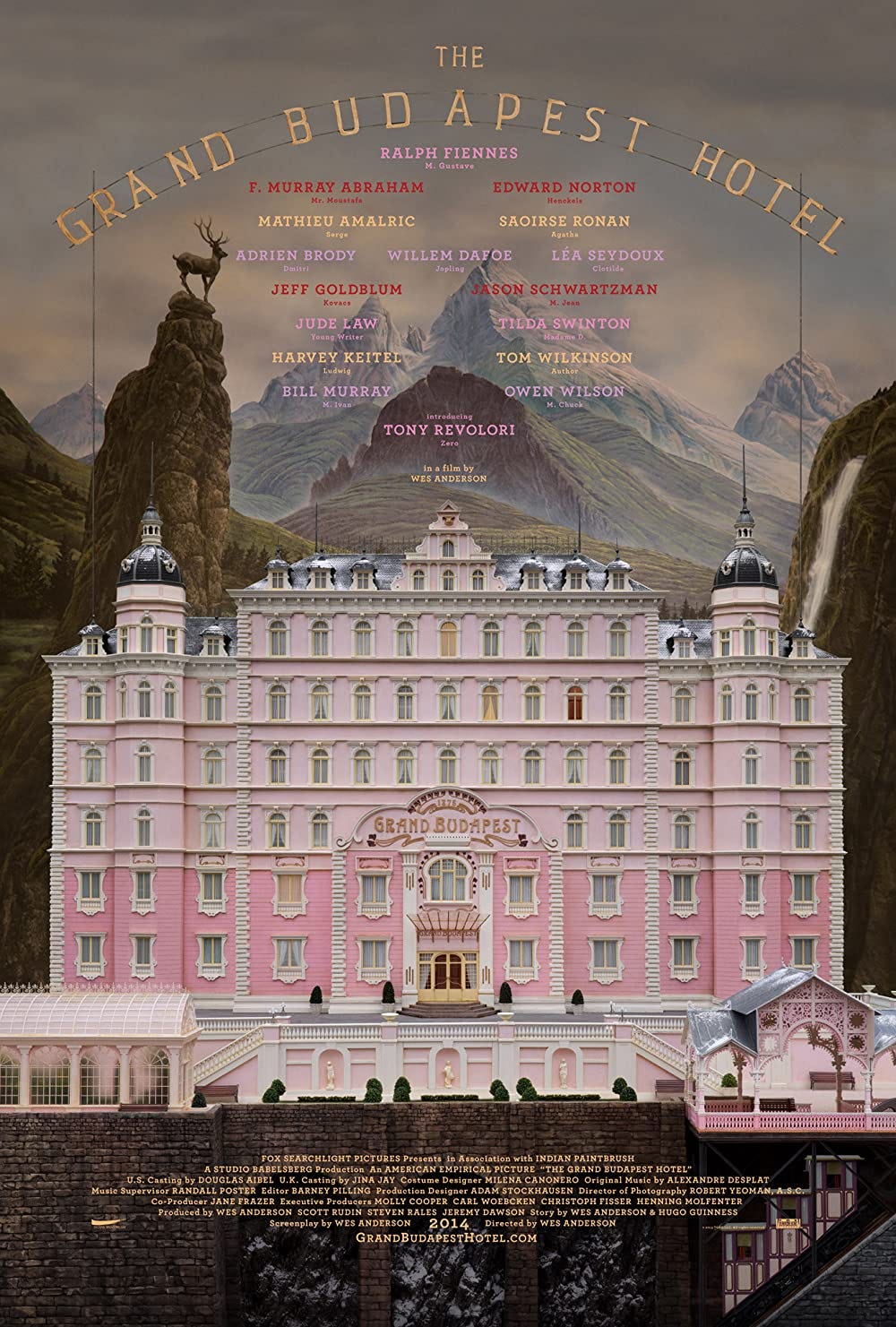
It’s worth it to rewatch Life Aquatic for Willem Dafoe’s drip